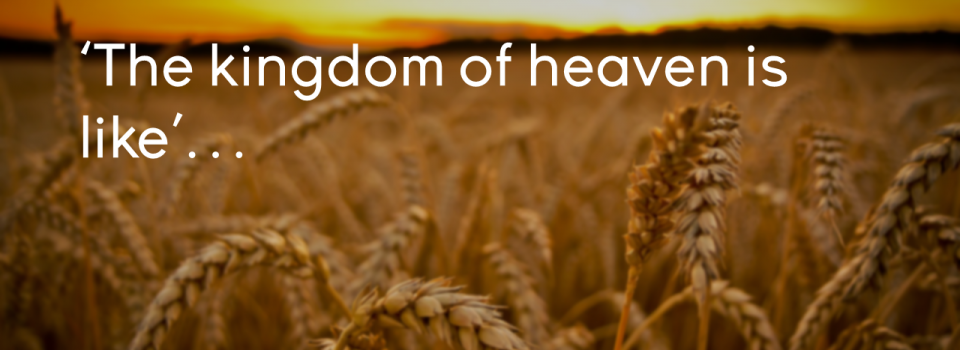Lenten Devotional – Tue, Mar 2: MOURN
Tue, Mar 2: MOURN
At first pass, in English, this sounds like a blessing for the bereaved. As if it was meant only those who are grieving. Yet it encompasses more.
All by itself, grief is a defining human experience. People mourn for those who have died. According to Maxie Dunnam and Kimberly Dunnam Reisman,“Sorrow and tears are part of life. The ability to cry is a gift from God. … The Bible talks about all kinds of sorrow and mourning, and it certainly makes the case that weeping and mourning are part of life. In fact, the Bible uses twenty Hebrew words and thirteen Greek words to express sadness and grief. Mourning is a natural human response.”
Yet translators say that this blessing’s intention covers a broader human experience. Perhaps we can also expand this blessing to those with mental health challenges such as depression or other conditions such as traum and loss. It embraces the broken-hearted or sorrowful.
Sometimes we express personal loss. Other times it’s societal.
Another scholar, named Boring, says those who mourn fall into the category of people who lament. Boring writes, ‘they lament the present condition of God’s people and God’s program in the world.’ They are folks dissatisfied with the current conditions of the world. They are restless, and cry out against the human experience of injustice and oppression, illness and suffering. They long for the ideals of the kingdom of heaven to unfold. They’re advocating and actively working toward transformation.
We are in holy company when we mourn. Martha Stortz summarizes the grief shown in the life of Christ as both personal and societal. “Jesus tears over the loss of a dear friend, the fate of a great city, and his own impending death establish his humanity. He knows the full range of human experience, and the comfort he offers comes from the depths of suffering.”
Then comes the word of teachers such as Rumi and the wisdom of our own Christian philosophers and guides from St John of the Cross and Teresa of Avila to CS Lewis, Joan Chittister, and Richard Rohr. They remind us to open the door to our emotional and psychological houses, and allow grief and pain to enter our hearts. Give them space. Work with them. Learn from them.
How many ways does this Beatitude name times in your life? — Rev Gail
Sorrow prepares you for joy.
It violently sweeps everything out of your house,
so that new joy can find space to enter.
It shakes the yellow leaves
from the bough of your heart,
so that fresh, green leaves
can grow in their place.
It pulls up the rotten roots,
so that new roots hidden beneath
have room to grow.
Whatever sorrow shakes from your heart,
far better things will take their place.
― Rumi
In this sad world of ours, sorrow comes to all; and, to the young, it comes with bitterest agony, because it takes them unawares. The older have learned to ever expect it. I am anxious to afford some alleviation of your present distress. Perfect relief is not possible, except with time. You cannot now realize that you will ever feel better. Is not this so? And yet it is a mistake. You are sure to be happy again. To know this, which is certainly true, will make you some less miserable now. I have had experience enough to know what I say; and you need only to believe it … ― Abraham Lincoln
Some people, they can’t just move on, you know, mourn and cry and be done with it. Or at least seem to be. But for me… I don’t know. I didn’t want to fix it, to forget. It wasn’t something that was broken. It’s just…something that happened. And like that hole, I’m just finding ways, every day, of working around it. Respecting and remembering and getting on at the same time. ― Sarah Dessen
Everyone keeps telling me that time heals all wounds, but no one can tell me what I’m supposed to do right now. Right now I can’t sleep. It’s right now that I can’t eat. … Right now all I seem to do is cry. I know all about time and wounds healing, but even if I had all the time in the world, I still don’t know what to do with all this hurt right now. ― Nina Guilbeau
Give sorrow words; the grief that does not speak knits up the o-er wrought heart and bids it break. ― William Shakespeare
Unless you have been very, very lucky, you have undoubtedly experienced events in your life that have made you cry. So unless you have been very, very lucky, you know that a good, long session of weeping can often make you feel better, even if your circumstances have not changed one bit. ― Lemony Snicket
Someday you’re gonna look back on this moment of your life … You’ll see that you were in mourning and your heart was broken, but your life was changing … ― Elizabeth Gilbert
Challenge or Question: How has grief or sorrow been a teacher in your life? What have you learned from it? Consider writing a letter — in a notebook or journal — to someone whom you’re missing or grieving or about an issue that is breaking your heart.
Lenten Devotional – Mon, Mar 1: WHO
The people referenced in these blessings are considered in a communal way. In particular, they are the followers of Christ within the Greek-speaking community for whom the author of the Gospel of Matthew wrote. They are also, in another sense, all humans. Common folk. People like you and me.
We might not want to recognize ourselves in these lists, or in others who find themselves described within the Beatitudes. It’s an uncomfortable association.
Yet among these lists of challenging human conditions, we’re likely to identify with one or more of the circumstances that are described by Christ in the Beatitudes. Since we’ve had these experiences, we are encouraged to develop empathy and connection with others. If we have recognized ourselves in these Beatitudes, we can also reach out to those who are living within these circumstances and experiences.
These blessings remind us that we are connected to each other, as well as being welcomed into the community of God’s children. This expansive view of who is blessed also cautions us that we’re not in charge of the invitation list for the kingdom of heaven. We don’t decide who sits at the common table.
This human community belongs to Christ, who has given out the invitations. Now, elbow to elbow, we’re invited to share more than just a meal. — Rev Gail
Meditations:
You are me, and I am you.
Isn’t it obvious that we “inter-are”?
You cultivate the flower in yourself,
so that I will be beautiful.
I transform the garbage in myself,
so that you will not have to suffer.
I support you; you support me.
I am in this world to offer you peace;
you are in this world to bring me joy.
— Thich Nhat Hanh
Challenge or Question: Who in your life is a sounding board for you? Who holds up a mirror for you and helps you become more self-aware? And for whom do you offer this reciprocity?
Feb 28, 2021 – Second Sunday in Lent
Worship Service
Message: Comfort & Inheritance
WEEK TWO of LENT: Devotional – Sun, Feb 28: BLESSED
Beatitude texts for week two:
02. Blessed are those who mourn, for they shall be comforted.
03. Blessed are the meek, for they will inherit the earth.
Sun, Feb 28: BLESSED
The scholars Malina & Rohrbaugh suggest that the blessedness of Beatitudes also refers to honor. It means to ‘bring honor’ or to be ‘filled with honor’.
What then is the blessing for those who are sorrowful, or as some translators more broadly explain, live in misery or protest at the wrongs and hurts experienced by other humans in their communities? And what does meek mean, anyway? Who identifies as meek? What gift is offered to them by Christ?
Again, Christ’s statements seem to honor those who find themselves in this doleful emotional or psychological state. And recognizes those who are humble and gentle, yet will stand against what is wrong in the world. Rather than isolating them, ignoring them, criticizing them or trying to ‘fix’ them, Christ sees such people. In his life, he kept company with them. Reached out to them. Sat with them. Listened to them. Attended to their needs. Only then did Christ choose to teach and preach. He cared first for their physical and spiritual wellbeing.
In our times, Christ doesn’t necessarily change the causes of people’s suffering. Yet his recognition offers a response. Through engagement with those who mourn and grieve, who are sad and miserable, he honors their state of being. He draws them into the perception of God, beneath the gaze of heaven, and into the sight of other people. — Rev Gail
When I started counting my blessings, my whole life turned around. — Willie Nelson
You have to participate relentlessly in the manifestation of your own blessings. — Elizabeth Gilbert
Blessed are the hearts that can bend; they shall never be broken. — Albert Camus
Like a thin place, a blessing can help us perceive how heaven infuses earth, inextricable from daily life, even when that life is marked by pain. — Jan Richardson
Concentrate on counting your blessings and you’ll have little time to count anything else. — Woodrow Kroll
Those who expect to reap the blessings of freedom, must, like men, undergo the fatigues of supporting it. — Thomas Paine
Not what we say about our blessings, but how we use them, is the true measure of our thanksgiving. — W.T. Purkiser
Live your truth. Express your love. Share your enthusiasm. Take action towards your dreams. Walk your talk. Dance and sing to your music. Embrace your blessings. Make today worth remembering. ― Steve Maraboli
A kind gesture can reach a wound that only compassion can heal. ― Steve Maraboli
God gave you a gift of 84,600 seconds today. Have you used one of them to say thank you? ― William Arthur Ward
Challenge or Question: Identify a blessing within your life. One aspect of your life for which you are grateful. Give thanks for it. Say a prayer, write it in a journal, or light a candle to acknowledge this blessing.
Lenten Devotional: Sat, Feb 27: IS
In these Beatitude statements, the ‘to be’ verb is open-ended. It is not past tense. It is not even present-tense. Nor is it conditional. It creates the world by declaring it as accomplished.
In fact, as Maxie Dunnan and Kimberly Dunnan Reisman write, “Originally there was no verb in the Beatitudes … ‘are’ … did not appear in the original Greek or Hebrew text. That word was added to bring out the meaning of each sentence.” William Barclay explains, “Jesus did not speak the beatitudes in Greek; he spoke them in Aramaic … The Beatitudes are not simple statements; they are exclamations.”
To retain that meaning across different languages, the verbs used to translate this Beatitude from Aramaic into Greek, shape a statement that presumes that what it declares will become true. It emphatically pronounces it and renders it real. The scholar Boring says, “The beatitudes are written in unconditional performative language. They do not merely describe something that already is, but bring into being the reality they declare.”
Within this verb, we do not find a promise for the future. Rather this is a spiritual wealth, rooted in belonging to each other and to God’s kingdom, that is already ours. Dunnan and Dunnan Reisman add, “This means that the Beatitudes are not an explanation for what might be—could be; they are exclamations of what is. … And it is ours now, not in some future time.” It’s the first of several paradoxes.
When Christ says it, this blessedness unfolds. The Word creates. Again and again, over and over, then and now.
Perhaps the people described within each Beatitude statement don’t feel blessed or special. The circumstances described in each Beatitude aren’t ones that we, as humans, aspire to attain. We don’t want to be poor, hungry, or sorrowful.
Yet these states of being are part of the human condition. And Christ confers a blessing on these least likely of humans. Yes, we can admit, that we may continue to wonder, where is the blessing that comes with this circumstance in which I find myself? Maybe we even think: I’d rather return the blessing so that I do not need to live in these undesirable, unwanted conditions.
Our perspective about these worrisome, painful, underdog conditions — these difficult states of being now labeled as blessings — are forever changed by Christ’s attention. Martha Storz tells us, “Jesus blesses us by sharing our lot and reversing it … A philosopher calls this sort of speech performativespeech because the words themselves deliver the goods. A Christian calls this incarnation.” Back in Jesus’ time, and now in ours, perhaps the blessing begins by being seen and acknowledged as one who matters in the eyes of God. — Rev Gail
Meditations:
I was born the day I thought: What is? What was? And what if? — Suzy Kassem
Be yourself; everyone else is already taken. ― Oscar Wilde
You may not control all the events that happen to you, but you can decide not to be reduced by them. ― Maya Angelou
Make the most of yourself … for that is all there is of you. ― Ralph Waldo Emerson
Don’t you ever let a soul in the world tell you that you can’t be exactly who you are. ― Lady Gaga
Challenge or Question: What is possible for you? What limits have you put on yourself? What limits have been placed on you? When have you been seen and valued for yourself?



